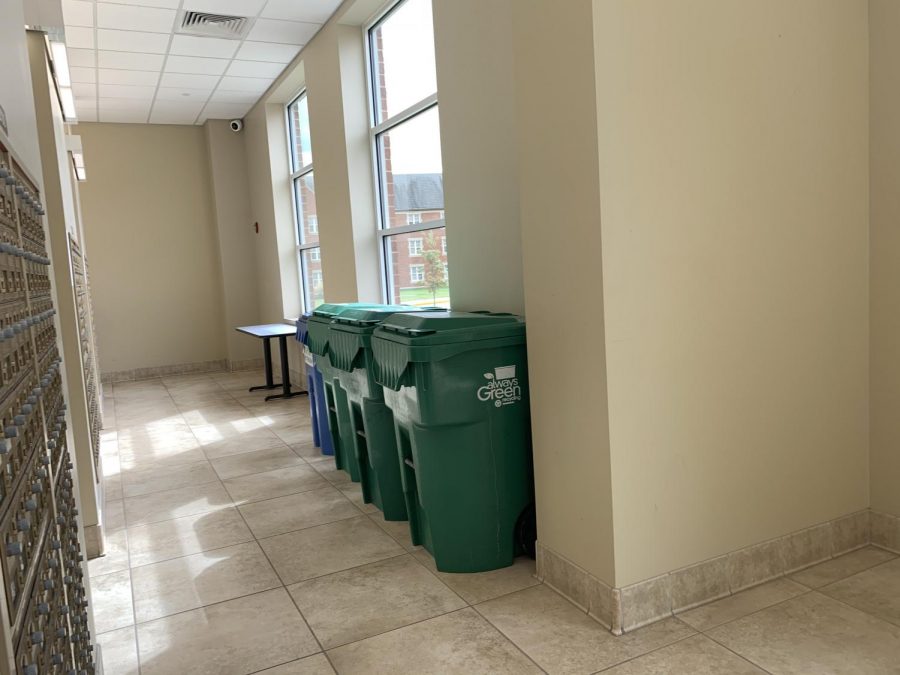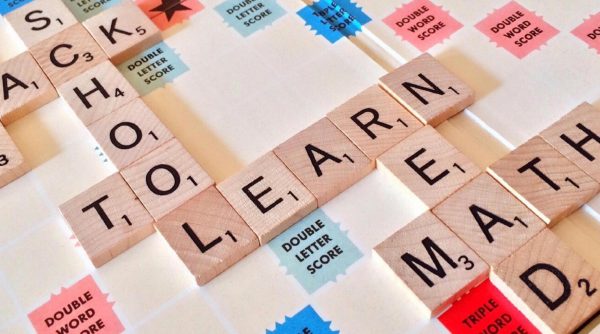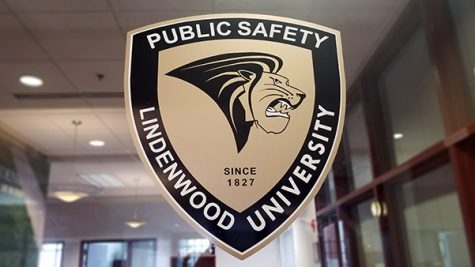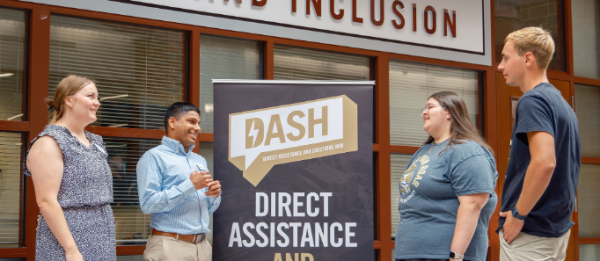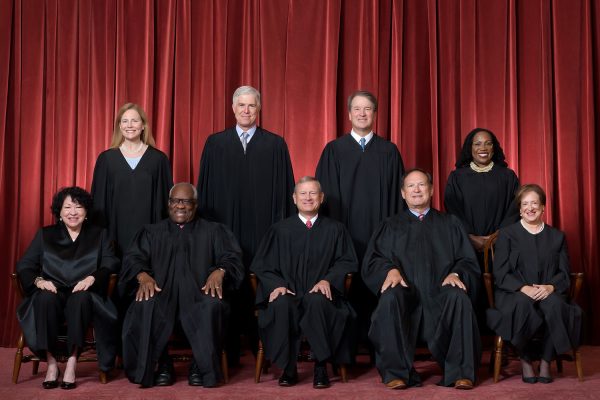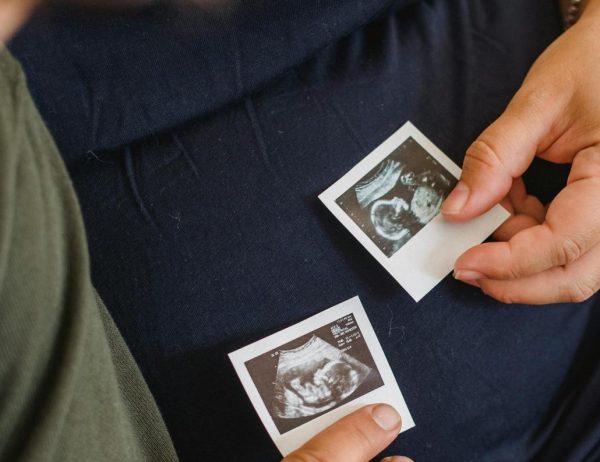Takeout dining options increase plastic waste; recycling options on campus for students
Photo by Mia Tebbe
October 13, 2020
While recycling used to be a free service at Lindenwood, the university now has to pay to recycle as plastic waste increases across the nation due to COVID-19 takeout options.
Lindenwood hires Always Green Recycling Inc. to pick up the recyclable material on campus, which costs the university $10,000 a year.
Like other college campuses, in an effort to curb the spread of COVID-19, Lindenwood has decreased the availability of dine-in meals in dining halls, causing many students to select their meal plans with the grab and go option. A majority of the takeout options are packaged in plastic containers.
Other universities in the St. Louis area, such as Washington University, have created low-impact dining options that include reusable food containers and the distribution of reusable utensils for the fall 2020 semester.
Lindenwood Vice President of Operations Diane Moore said in an email that due to high demand by numerous universities and businesses, environmentally friendly containers are less available than plastic options.
“Campus Operations worked closely with our food service provider to establish a safe process for students to secure carry-out meals,” Moore said. “Unfortunately numerous universities, K-12 schools and businesses are prioritizing and seeking to achieve comparable objectives which places a strain on the availability of environment-friendly containers.”
Though there have been efforts by the Lindenwood Student Government to create recycling options in housing in the past, there are currently no recycling options for students in residential housing or residence halls.
Moore said Lindenwood previously had recycling bins in residence halls, but they were removed due to students not sorting recyclable material and trash into their proper bins.
“Some years ago the University placed recycling bins in the residential halls. This occurred when recycling was free to the University,” Moore said. “Unfortunately, students did not separate trash from recycling items and threw many nonrecyclable items into the bins.
“As the recycling bins were emptied, the time it took to sort items that could not be recycled was charged back to the University. Due to the costs, the University determined the recycling bins had to be removed from the residential halls. Students dedicated to recycling are encouraged to use the outside recycling bins as well as any academic/administrative recycling bins.”
While students do not have recycling options in residential halls and housing, Moore said that there are recycling options for students in all academic and administrative buildings on campus, as well as outdoor dumpsters and bins available for use.
“In addition there are compost bins for Spellmann Center and Evans Commons to compost discarded food,” Moore said. “According to our recycling provider, approximately 12.6 tons of compost is picked up monthly.”
Moore said that due to the international changes impacting recycling, Always Green Recycling services are now costing the university $10,000 a year.
“With multiple years of careful budget reductions, the University has continued to maintain the existing recycling program. However expanding services resulting in increasing costs would require further review and consideration,” Moore said.
While Lindenwood does not generate or release an annual sustainability report, Moore said that the university has a Chemical Hygiene Committee that outlines all federal environmental health and safety requirements, and is making other efforts toward becoming environmentally friendly.
In addition, Moore said the university will engage architects and engineers in Leadership in Energy and Environmental Design (LEED) recommendations before construction begins on campus to make cost effective choices.
Moore said the Operations Department is actively converting internal and external lighting on campus to LED (light-emitting diode) lighting, and the process will continue over the next few years until all lighting is switched to LED.
Arin Froidl, a senior at Lindenwood who recycles, said it can be hard to find places to recycle on campus that aren’t a hassle.
“There’s the can behind the bookstore and I think there’s a can in Evans, but I don’t want to drag my paper and plastic trash across campus to dispose of it,” Froidl said through Snapchat. “Lindenwood definitely doesn’t offer enough recycling options.
“Even a recycling bin in each dorm building would be better, but I really think we should have recycling dumpsters on campus or recycling cans in the dining halls.”
Froidl said that while she doesn’t think plastic waste has increased on campus this semester due to having takeout options before COVID-19, there are other container options besides plastic that Lindenwood can use.
“There are so many paper and cardboard alternatives to plastic and styrofoam that I don’t understand why Pedestal continues to use them,” Froidl said.
As for recycling participation on campus, Froidl said she is unsure if most students would recycle when given the option.
“In a perfect world, yeah, everyone would, but I’m a realist and I know how lazy college students are,” Froidl said. “Recycling takes effort; you have to wash everything before you throw it out, and I feel like most college students are too lazy to do that.”
Trisha Tamblyn, a junior on campus, said that she tries to recycle as much as possible, but she has yet to find a reliable source on campus for recycling.
“I know that Lindenwood has faced some issues with recycling…but I feel like there’s a lot more we could be doing that we just haven’t taken the initiative to do,” Tamblyn said in a text message. “We are in a time where recycling should be second nature, yet here on campus many students struggle to find the resource for that.”
Tamblyn said she believes plastic waste on campus is surging due to the mostly plastic takeout options.
“Plastic waste on campus has got to be at an all-time high due to the take out options. It just makes sense that we should take responsible actions in our disposal of this,” Tamblyn said.
Unlike Froidl, Tamblyn said she believes a majority of students would recycle and do their part when given the option.
“I think that recycling is the easiest form of care for our planet that we can do, and if given the option, the majority of students would take part in that,” Tamblyn said. “We have a thoughtful and kind student body, and I truly believe that we, as a whole, would take that extra step should it be given to us.
For students who wish to recycle, it is important to remember that when recycling plastic bottles and containers, first empty the contents of the container and rinse out before placing them in the bin. Food and styrofoam cannot be recycled.
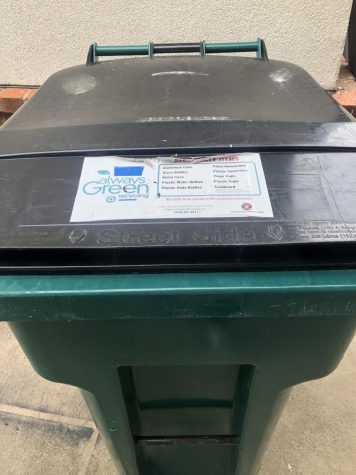
Material that can be recycled:
Aluminium cans, glass bottles, metal cans, plastic water bottles, plastic soda bottles, paper/newspaper, plastic containers, paper cups, plastic cups, and cardboard.



